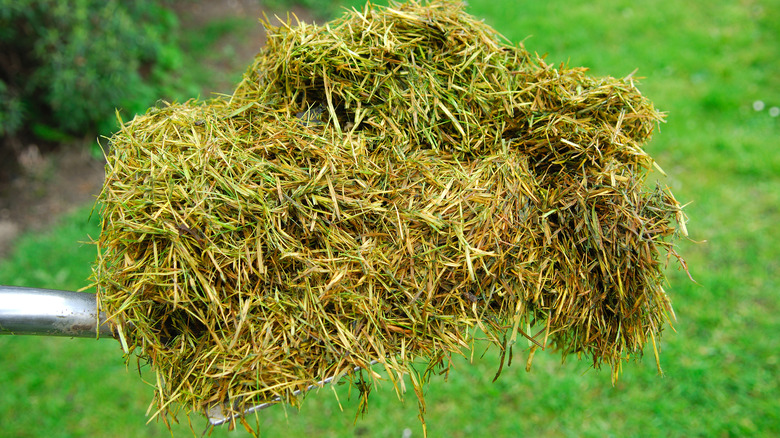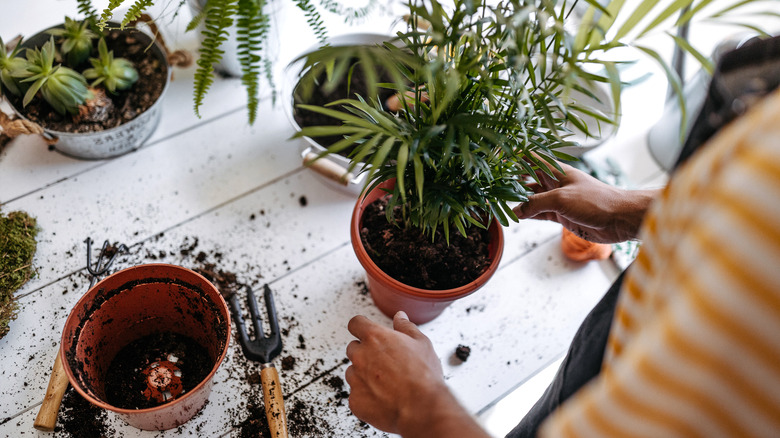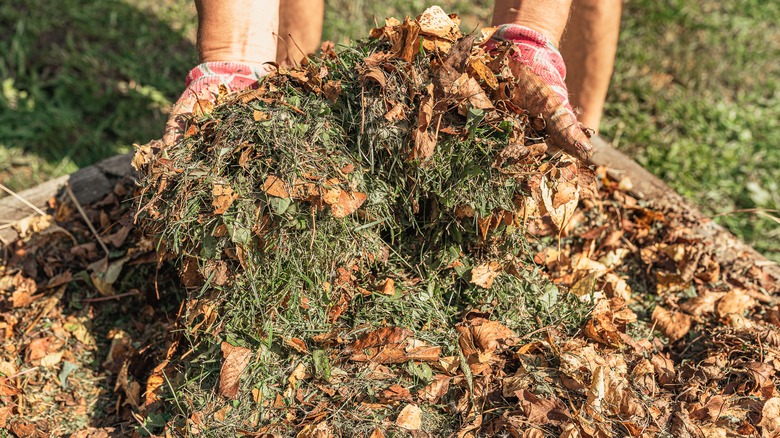How Lawn Clippings Can Benefit Your Potted Plants
The worst part about mowing the lawn is realizing you are only a few passes through and the bag of lawn clippings is already full. You'll detach the bag and heave the heavy contraption across the yard to your compost pile or lawn clippings bag, breaking a sweat, and you've still got more than half the yard to mow. But rather than tossing those lawn clippings aside (or over the fence into your neighbor's unsuspecting yard), save some grass for your garden — or more specifically, your potted plants.
You may not know that the cuttings from your grass contain essential nutrients that many of your potted plants or garden veggies use in order to grow and thrive. By sprinkling the clippings into the potting soil, you can nourish your plants and cut down on your yard waste. So next time you mow the lawn, start collecting the cut grass to reuse for your hungry potted plants.
How to incorporate lawn clipping into your potted plants
Using grass clippings to nourish potted plants is an effective and eco-friendly way to recycle organic material and provide essential nutrients to your plants. After mowing your lawn, gather the freshly cut grass clippings. Spread them out in a thin layer on a clean surface in a well-ventilated area. Allow the clippings to dry for a few days until they become brown and crispy. Before applying the grass clippings, ensure that your potted plants are adequately watered. It's best to use this method on plants that are well-established and have established root systems.
Once the grass clippings are dry, sprinkle a thin layer, about half an inch thick, on the topsoil of your potted plants. Avoid piling the clippings too high, as this can lead to mold or pest problems. Alternatively, you can mix the clippings into the top layer of soil for a more uniform distribution.
Grass clippings provide several benefits to potted plants. First, they act as a natural mulch, helping to retain moisture in the soil and prevent weed growth. The clippings gradually decompose, releasing essential nutrients like nitrogen, phosphorus, and potassium into the soil, which are crucial for plant growth. These nutrients promote healthy foliage, root development, and overall plant vigor. Moreover, the decomposition process enriches the soil with organic matter, improving its structure, moisture-holding capacity, and nutrient-retention ability.
Uses for lawn clippings in your yard
Lawn clippings have several other great uses in your outdoor spaces. They are a valuable addition to compost piles. Mix the clippings with other organic materials such as leaves, kitchen scraps, and shredded newspaper to create a balanced compost mix. Since grass clippings are rich in nitrogen, an essential component for healthy compost, incorporating it will enrich your compost and future plants.
Grass clippings can also be used to topdress your lawn. After mowing, spread a thin layer of fresh clippings, around half an inch thick, over the grass. You'll return valuable nutrients to the soil, providing a natural source of nitrogen. Spread the clippings in thin layers to prevent matting or smothering the grass. Additionally, make sure the grass clippings are dry to avoid clumping. As the clippings break down, they contribute to a healthier, greener lawn.
Finally, grass clippings can be used to make a tea, or liquid fertilizer, for any of your plants. Fill a large container one-third of the way with grass clippings and then submerge them in non-chlorinated water. Cover the container loosely and allow the mixture to steep for up to two weeks, stirring occasionally. Strain the liquid using a mesh strainer or a cheesecloth into another container to separate the nutrient-rich liquid from the solid grass clippings. Dilute the grass clipping tea by mixing one part tea with three parts water. Use this diluted solution to water your plants with a nutrient-filled fertilizer.


